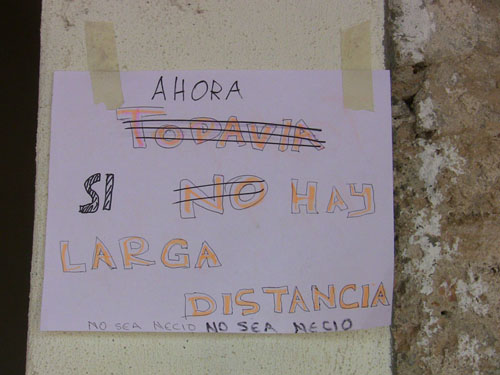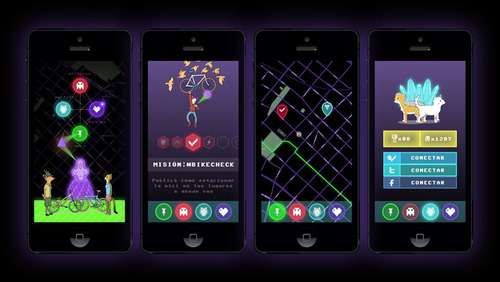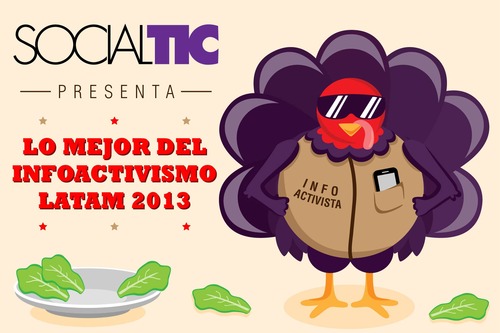The following article was originally published in SocialTIC and written by Indira Cornelio (@IndiraCornelio) and Juan Manuel (@jm_casanueva) with the support of the SocialTIC team. It is republished with permission. SocialTIC is a non-profit organization committed to promoting and preparing social groups in order to strengthen their activities through technology. You can follow them on Facebook and Twitter: @socialtic.
[All links are to Spanish-language pages.]
Coming from many hours in the making and an interest in the “best of 2013″ lists that usually saturate communication channels; a light chat between the members of SocialTIC following a meal ended in our first “The Year's Best of Latin American Infoactivism” list. Below, we've recounted sporadically and subjectively what inspired us to use TIC to generate social impact this year.
We hope that the projects highlighted here inspire the entire continent and that at the end of 2014 we repeat this same process in a larger and more collective way. All comments, thoughts and reflections are welcome and we'll happily share all inspirational projects with our networks.
The Best Advocacy Campaign LATAM 2013
We're pleased and excited to declare a winning campaign and two special mentions. In Mexico, La Alianza por la Salud [The Health Alliance] launched the campaign “12 cucharadas” [12 teaspoons] to alert the public to the risks of the excessive consumption of sugar from drinking soft drinks. Its efforts resulted in an historic tax on junk food and sugary drinks. The combination of street marches, performances in public spaces and activism in online communities was key in forming the now-existing citizen presence in favor of good nutrition.
In Uruguay, Proderechos [“Pro Rights,” a Uruguayan collective] reached its challenge of many years of direct advocacy and digital communication by promoting, along with other social stakeholders, the legalization of marijuana, setting an international and historic precedent. We also give a special mention to the NGO Derechos Digitales [Digital Rights], which has lead the circulation of information and actions against the Acuerdo Transpacífico (TPP) [Transpacific Agreement] through TPP Abierto. Unfortunately, this cause is still very much alive and in 2014 the NGO will continue working to diffuse the threats posed by the TPP in Mexico, Colombia, Peru and Chile.
The Best Campaign in Civic Betterment
Without a doubt, Revolución Jigote [the Jigote Revolution] has given us a lesson in infoactivism and civic betterment this year. From Santa Cruz, Bolivia, the jigotes have inspired thousands of young Bolivians to take up a civic position – that of being jigote (translating as cool, rad, awesome etc) – by being citizens who get involved in their city's problems and participate in their community. With six months of planning and definition of tactics, Revolución Jigote quickly reached its goal of positioning its action both on and offline. Now, alongside more than 30,000 followers in social networks, the project motivates and gives direction to Santa Cruz's youth. http://jigote.com/
The Best Combined On/Offline Action
This year, campaigns in Argentina and Costa Rica have inspired us to take a combined action both on and offline have an impact on social problems. Martes Rojos [Red Tuesdays] is a Buenos Aires-based project in which groups of people get together each Tuesday to remove propaganda promoting to the sex trade. This civic action has grown as a result of strengthening ties between participants in social networks, and they'll end the year with a platform, currently in its beta stage, allowing people to report sexual exploitation and trade.
In Costa Rica, civil actions in resistance to the concession of the west-bound highway ended well. A neighborhood group was formed in order to argue the project's deficiencies and encourage popular support. In an example of organization and strategy, the group was able to ground the project and exert enough pressure to detain it.
The Best Project Linking Citizens to Government
A ground-breaking Latin American project is El Partido de la Red [the Network Party]. Motivated by the idea to “hack democracy,” this group of young Argentinians aims to form a political party that works on the foundation of direct representation, and that when they have a representative in the local Congress of Buenos Aires would only vote based on what citizens indicated on their website. Currently this online platform, DemocraciaOS, is in the beta stage and has served as a way to group together citizens’ discussions about the situation and decisions made by their city.
The Most Inspiring Technology Project

In rural Mexican communities, a project started by Rhizomatica worked deliberately and in a refreshing manner to develop autonomous celular telephone networks. With their first community now connected in Talea de Castro, Oaxaca, Mexico, they've demonstrated that members of society and groups of hackers are able to endow the most disconnected people with cellphone network infrastructure. They are now working with volunteers to repeat the process and bring cell phone coverage to other communities as well as review the process of adoption of this new technology working under community autonomy.
In addition, we make a special mention of the groups of cycling-activists in the continent for their energy, tactics for civil participation and consistent activism. These cycling groups are transforming civil habits, public policy and conversing directly with the inhabitants of our complicated Latin American cities. They are an example to follow.
The Best Latin American Event

2013 hosted events which will be a watershed moment for social change in TIC communities. We'll highlight the open data “unconference” AbreLATAM that, in a horizontal format, encourages the exchange of experiences relating to open data between dozens of “techies,” community representatives and public servants in Latin America. AbreLATAM not only premiered an event that will be repeated annually, but also started a dynamic reflection between those who work with data in a more purposeful and shared way than that of traditional conferences.
We make a special mention of the Media Party de Hacks and Hackers Buenos Aires [Buenos Aires Hacks and Hackers Media Party] that in its 2013 edition, apart from having high level of data references, has generated civil and journalistic projects of great potential. In the region's north, they carried out the first Encuentro de video para el Cambio #V4C [Video for Change Meeting, hashtag #V4C], bringing together video-activists from Mexico, Guatemala, El Salvador, Nicaragua and Costa Rica.
The Best Video for Change
This year showed many examples of audiovisual production and protest. We noted that a lot of what we considered as reference points for activism on the Internet this year were produced in the second half of 2012 (we remember the campaign No Temas a Internet [Don't be Scared of the Internet] in Chile or No te Engoriles [Don't Get Angry] in Venezuela). However, in the face of Mexico's Energy Reform, the video Frack U is not only an entertaining parody, but also explains fracking didactically and shows evidence of the position of some members of the Mexican Congress.
The Best Electoral Tool
In the electoral context, digital media is key to encouraging both an informed vote and electoral vigilance. This year, we highlight the consolidation of Ciudadano Inteligente's [Intelligent Citizen] electoral products in the Argentinian and Chilean elections. Democracia en Red (Argentina) and Voto Inteligente (Chile) permitted users to compare the declarations of candidates, see how their campaigns were financed, identify where to vote and divulge information about key themes en an election.
We make a special mention of the involvement of the project Chequeado [Checking] in the Argentinian elections to verify the truth of public declarations. And in a pre-electoral context, the Costa Rican site Ojo al Voto [Eye on the Vote] is one to watch for the next elections in 2014.
The Best Data Visualization
We must admit that it was difficult to find data visualizations of a high level, and a use of visualization technology coming from citizen and societal groups. We hope that this tendency reverts throughout 2014. This time, the work of Andy Tow stood out, who had a prolific data year, coining in Argentina the phrase “another Andy Tow project.” With CIPPEC, Andy carried out the separate CIPPEC Data in which you can view and analyze data associated with Argentinian public policy making as well as a visual comparison between provinces. Andy also consolidated a data work of several years with “Línea Votada” [Voted Line], visualization of the past 10 years of nominal votes in the Argentinian lower and upper houses.
We make a special mention of two Argentinian projects, that for their management of themes and data are inspirational for Latin American infoactivists: “Cargografías” is a visual timeline of Argentinian public servants complemented by a provocative quote: “No es una historia, pero sí un recorrido. No es una denuncia, pero sí un dato,” [It isn't a story, but a tour. It isn't an accusation, but data]. We also mention the data map about “Represión Financiera y Terrorismo de Estado” [Financial Repression and State Terrorism].
The Best Civic App (Prototype)

After a year with the largest number of hackathons and app challenges in Latin American history, there are dozens of civic apps in the prototype stage that look to engage detail and be used by citizens and change agents to improve and resolve many of the distressing situations in our region. Right now, it's very difficult to highlight a single civic app and we hope that each one of them generates the value and social impact that it set out to do from the start.
Despite the competition, the app that most inspired us through both its concept and prototype is Bikestorming in Argentina which aims to engage the cycling population to participate in a network combining online gaming and useful information for all urban bike routes. We hope that Bikestorming will be supported by the public in 2014 as well as continuing to learn in this new crossroads that we face in improving life and civic interaction, supported by new technologies.
* You can read other Global Voices coverage of Abre Latam:
Abre Latam, an Open Conference for an Open Region
Abre Latam: Developers and Solutions for the Region
VIDEO: Los rostros detrás de Abre Latam. [es] [The Faces Behind Abre Latam]







